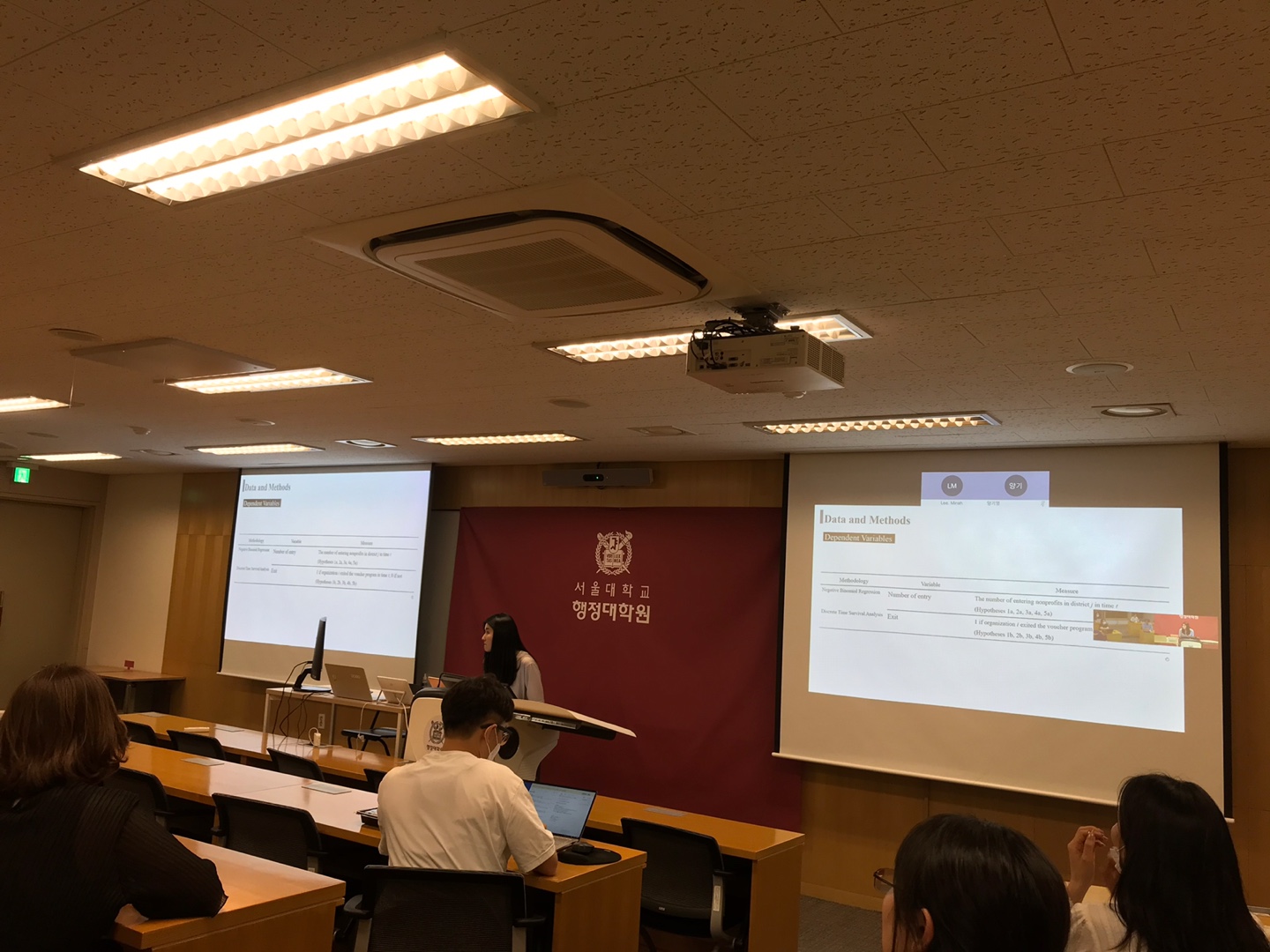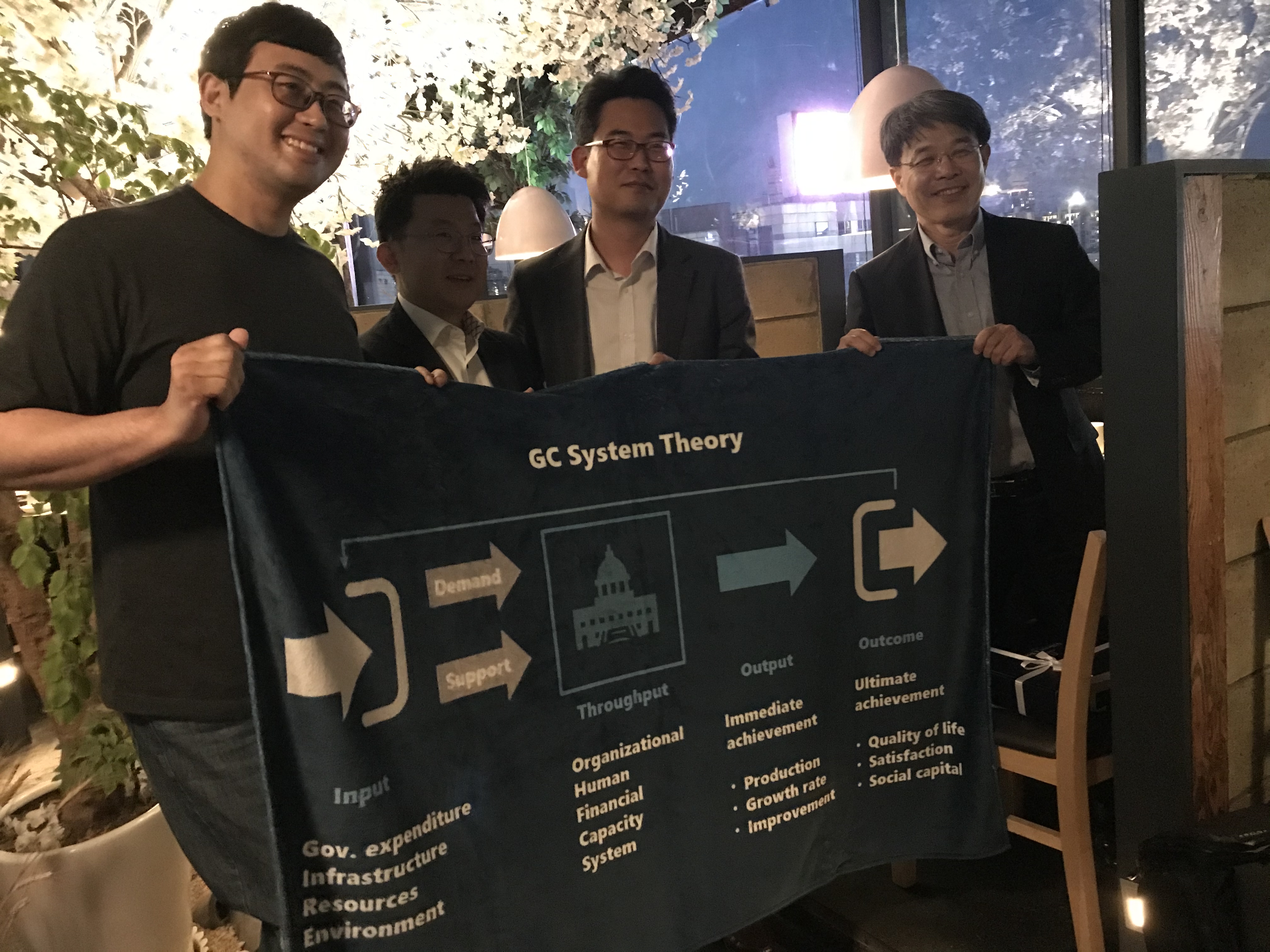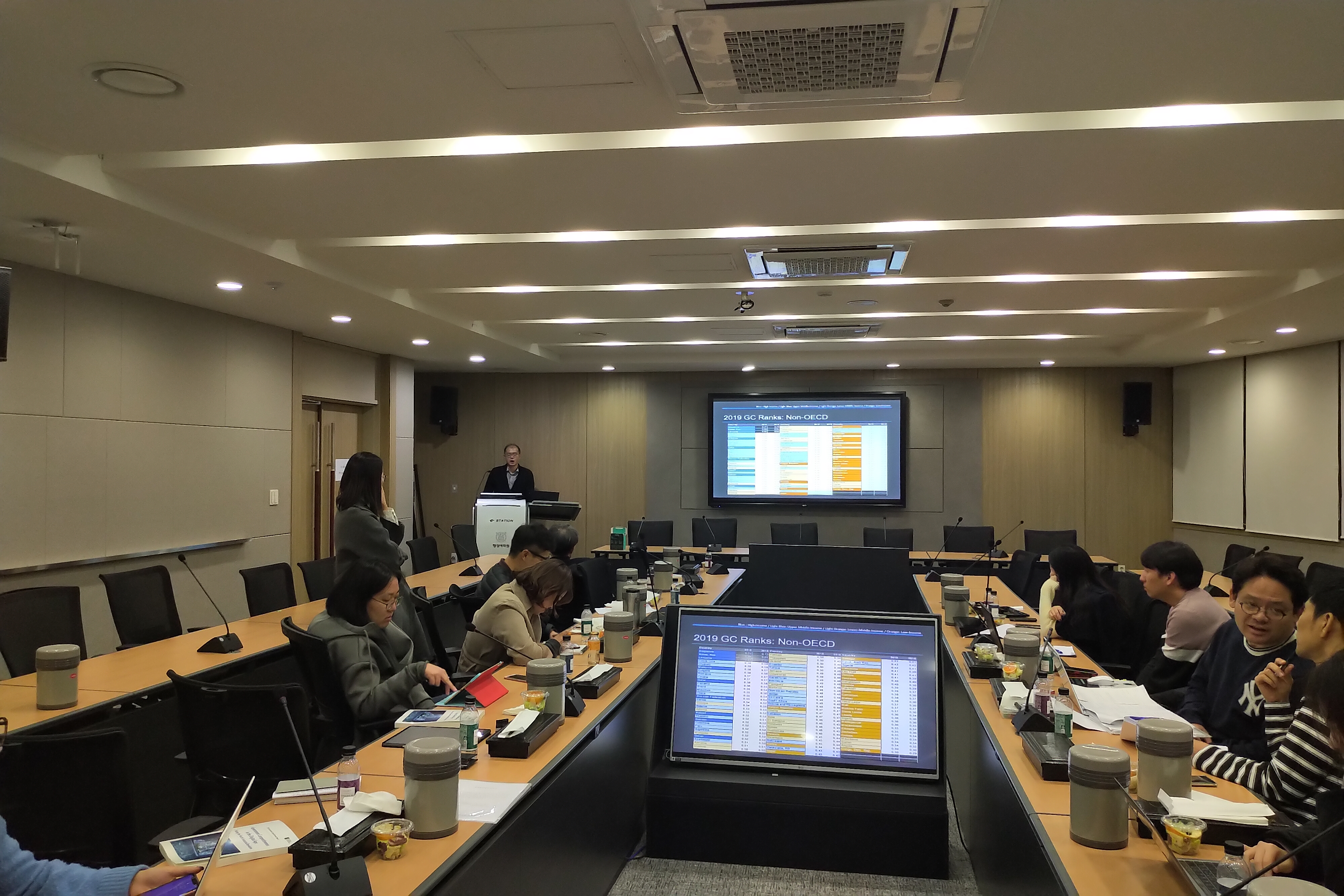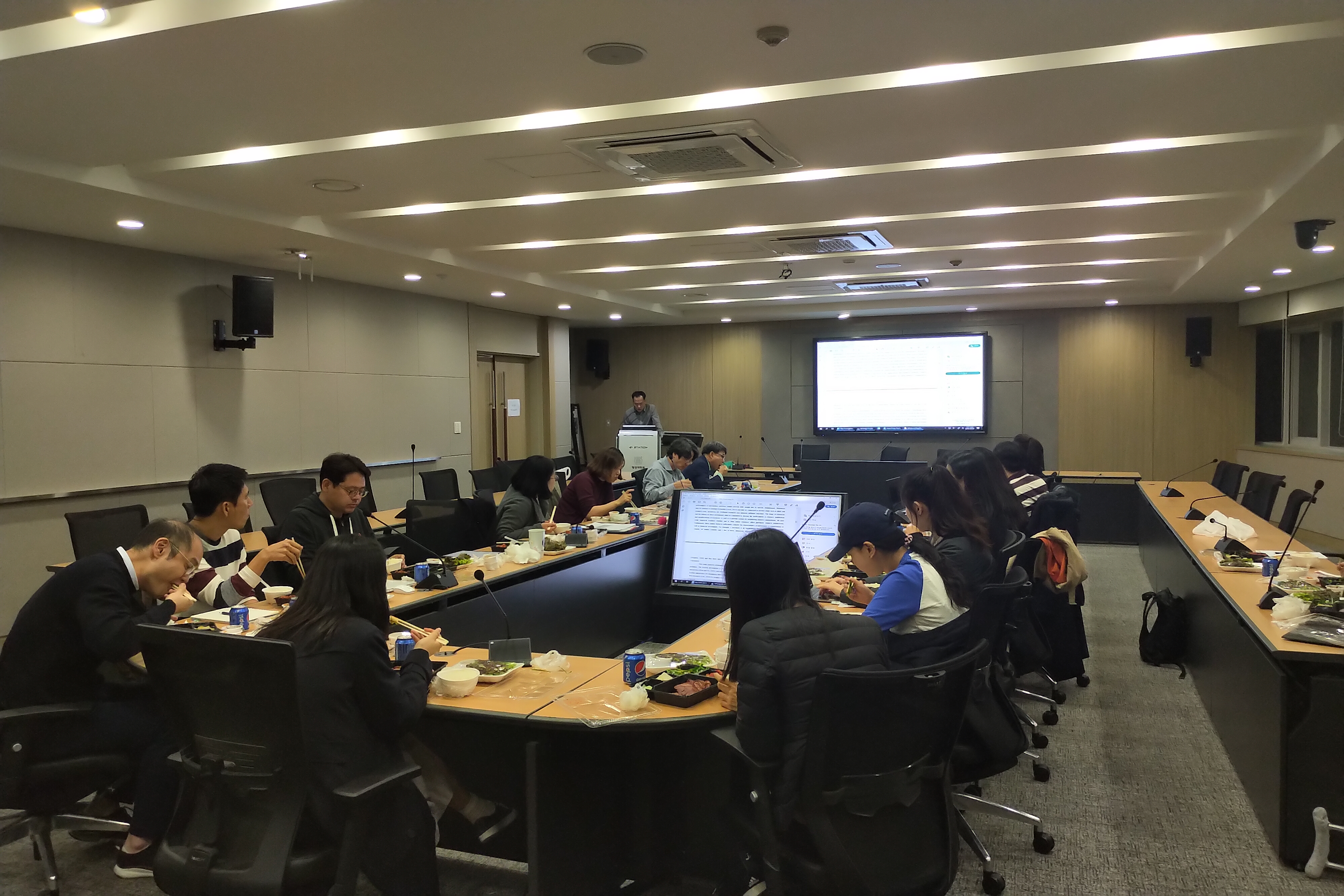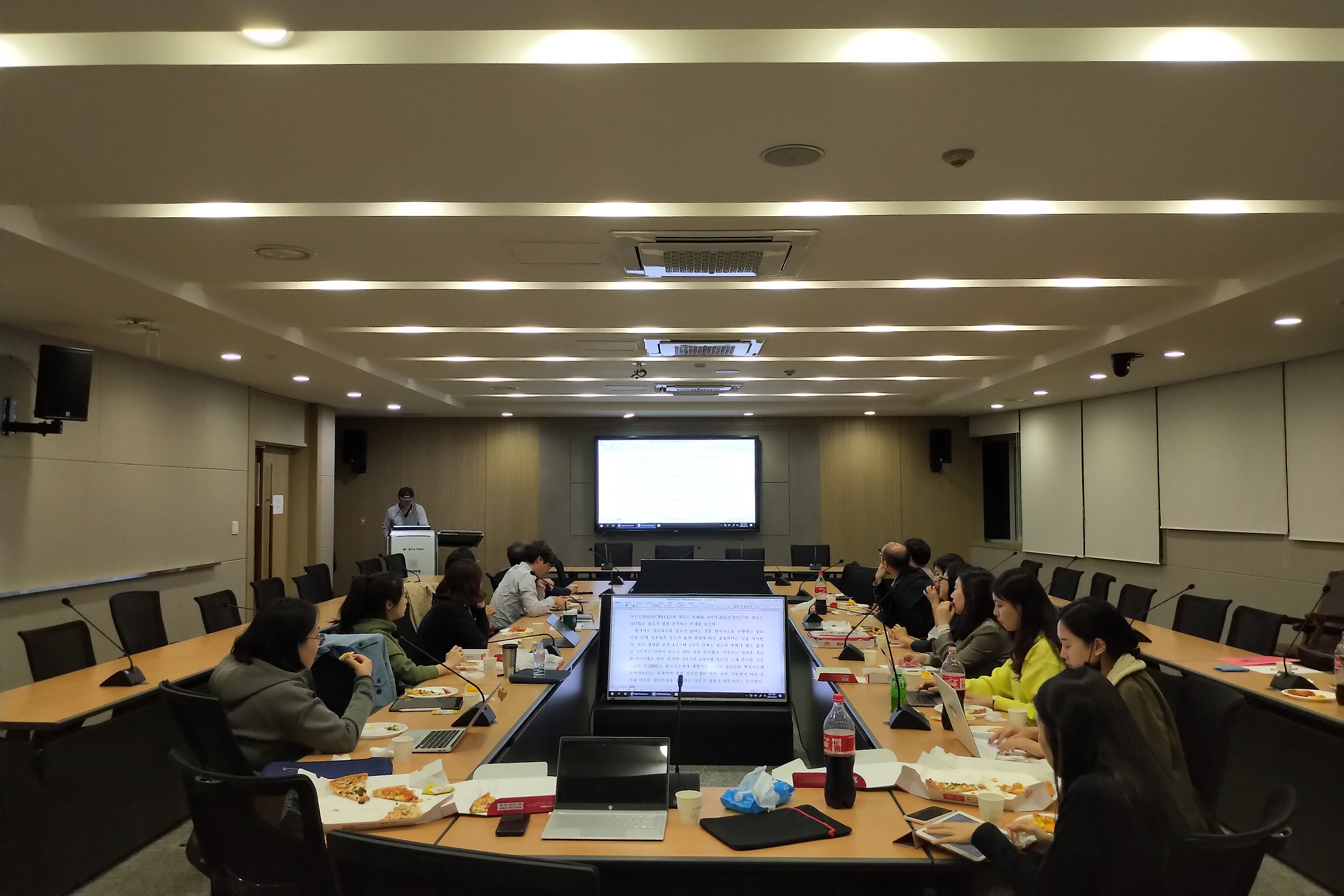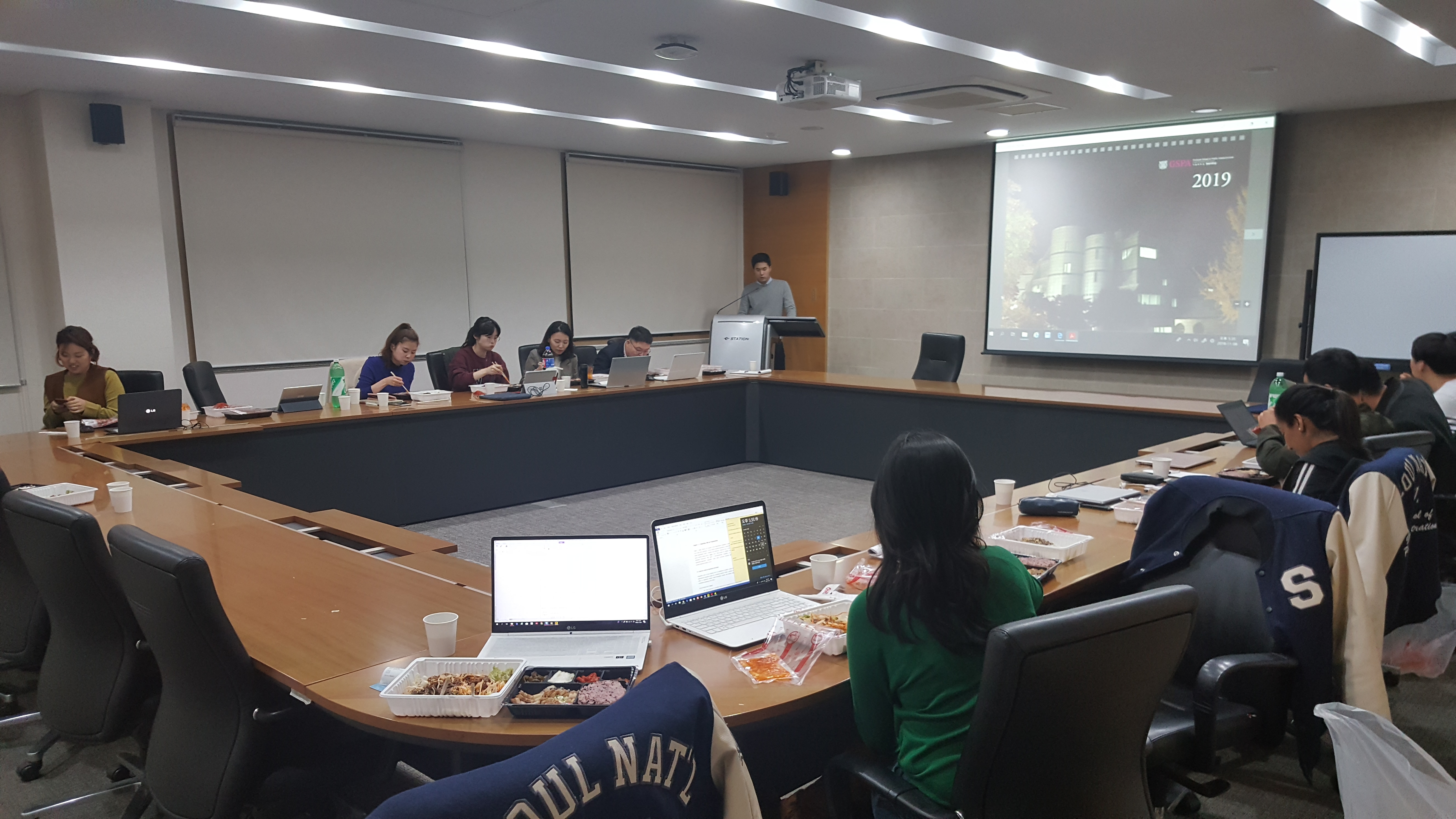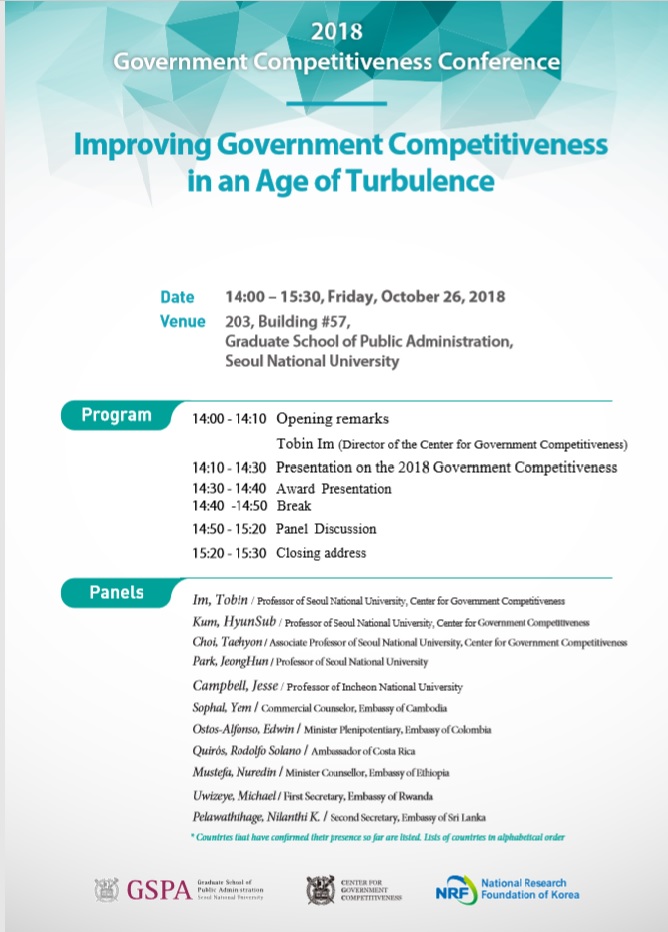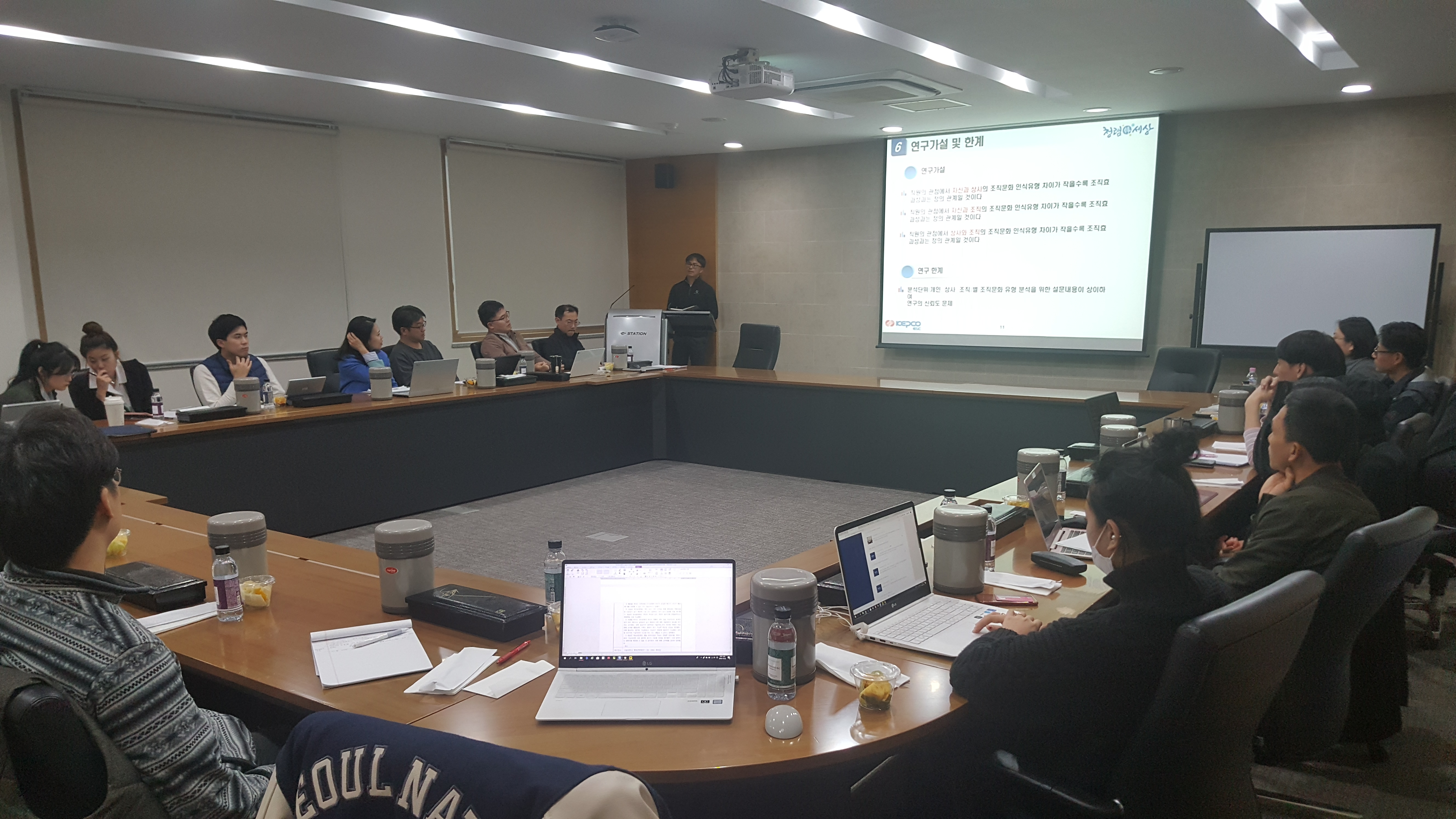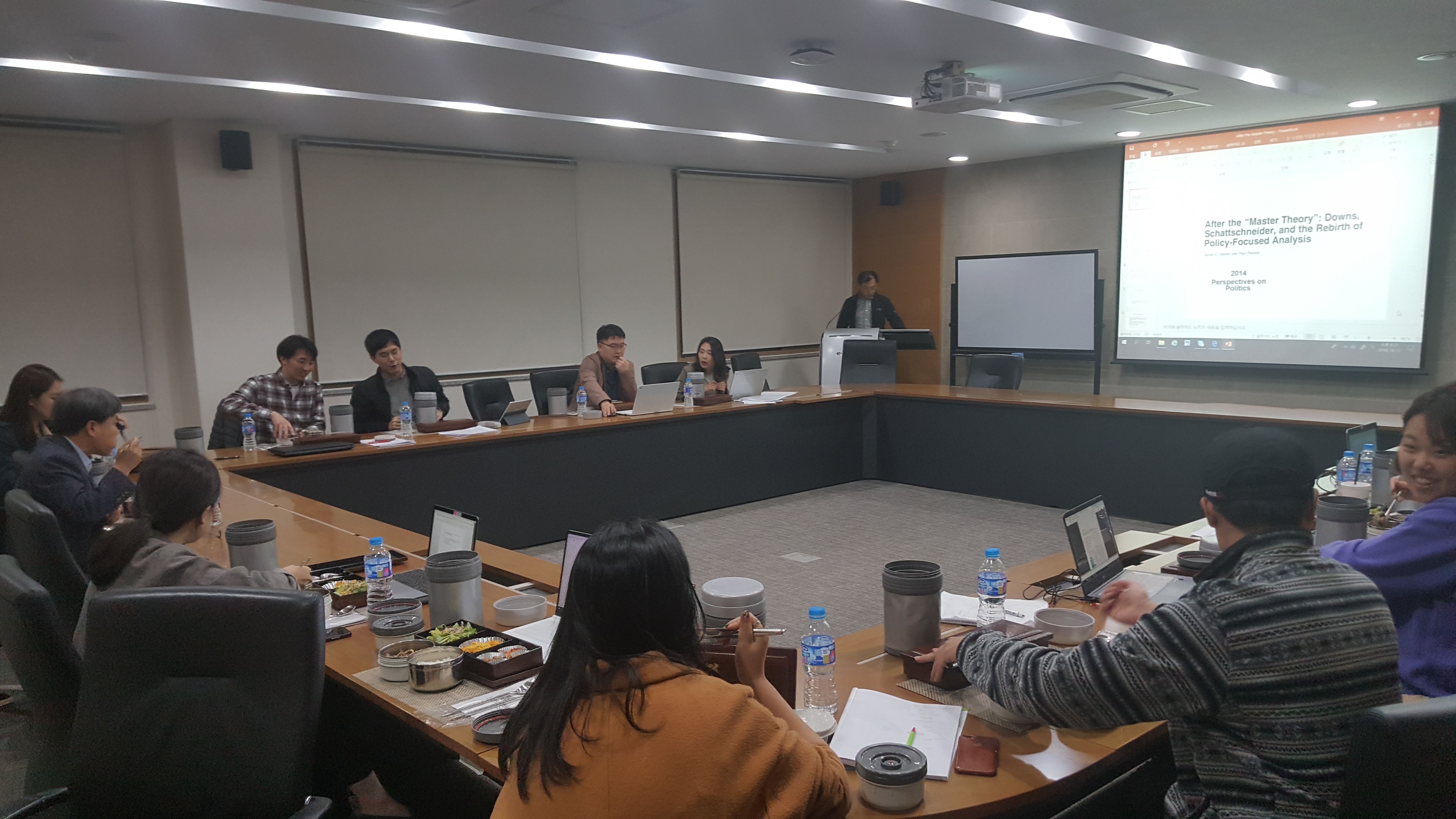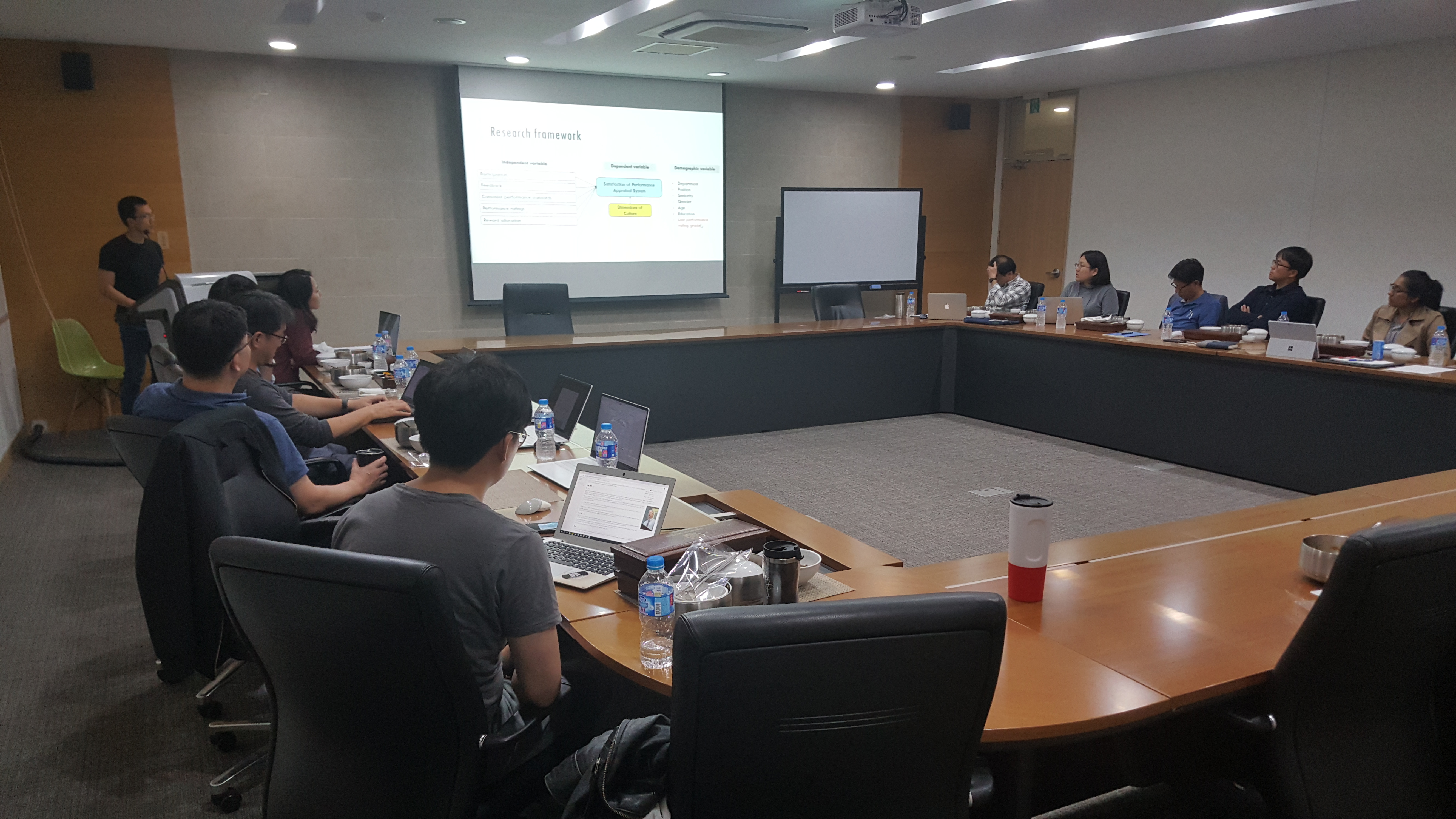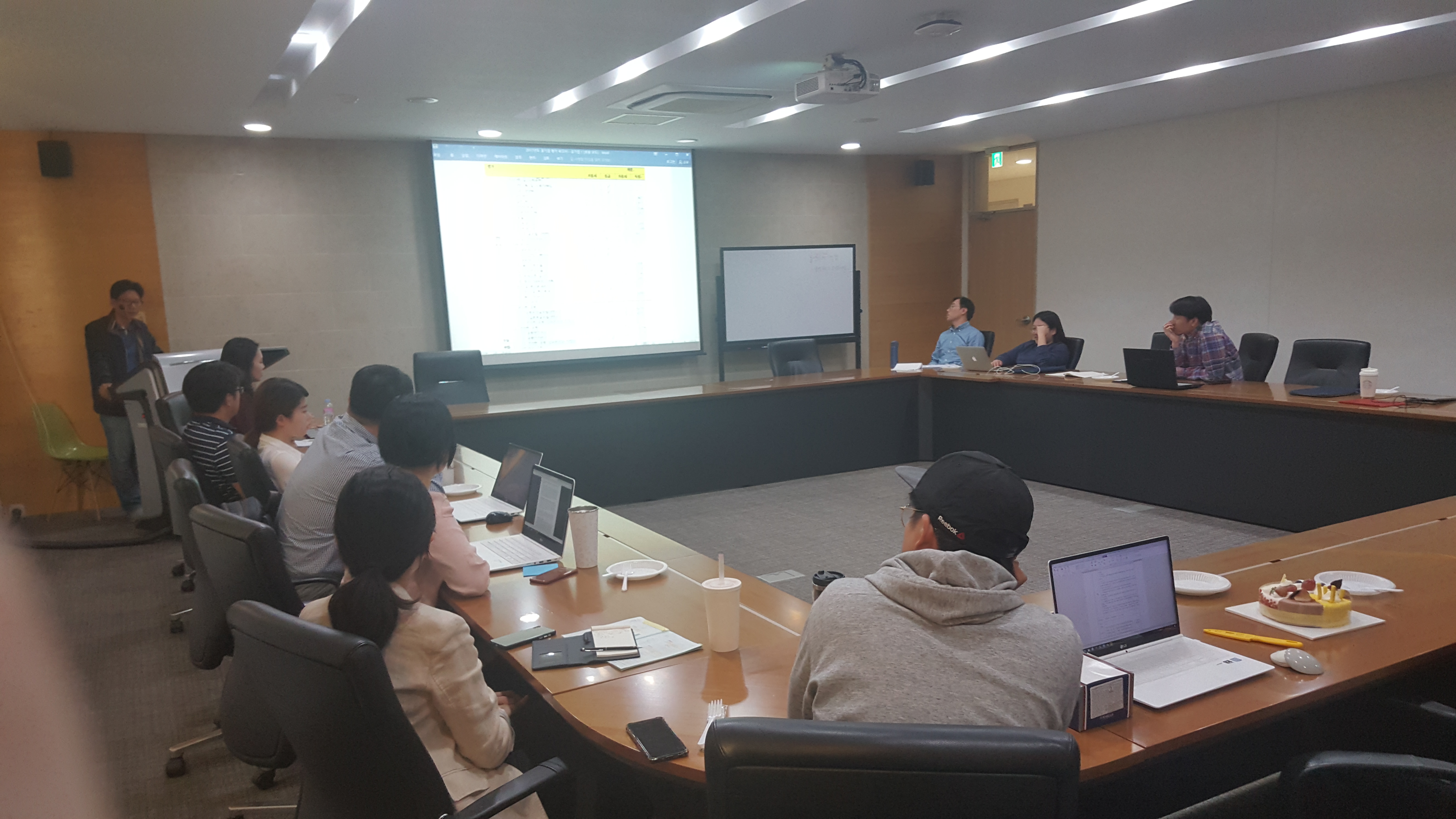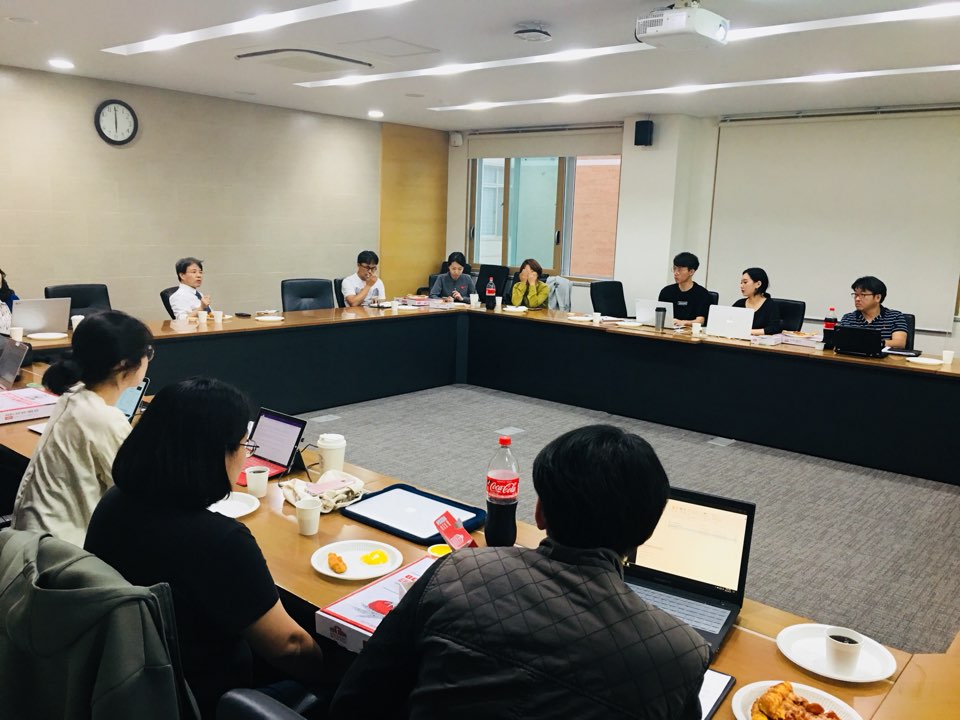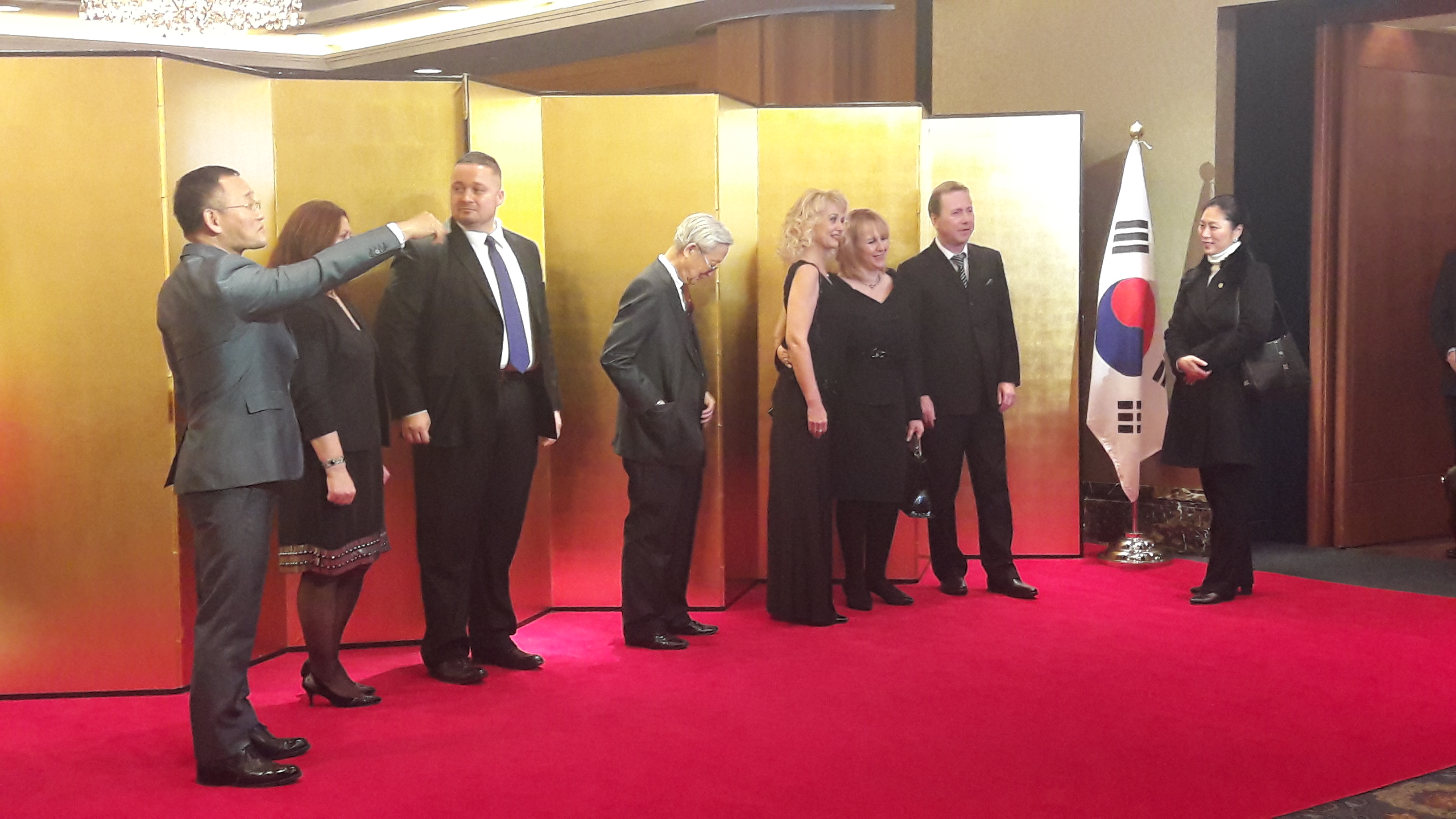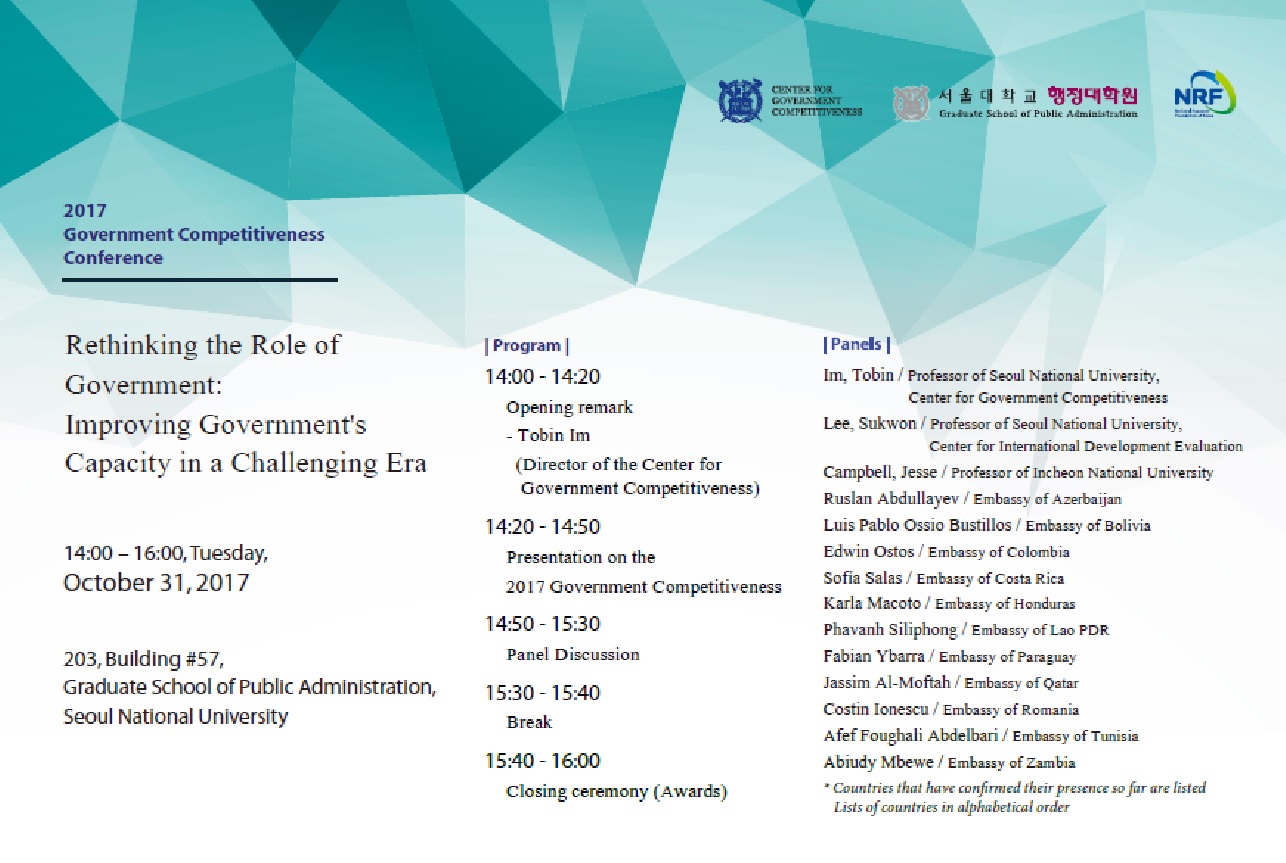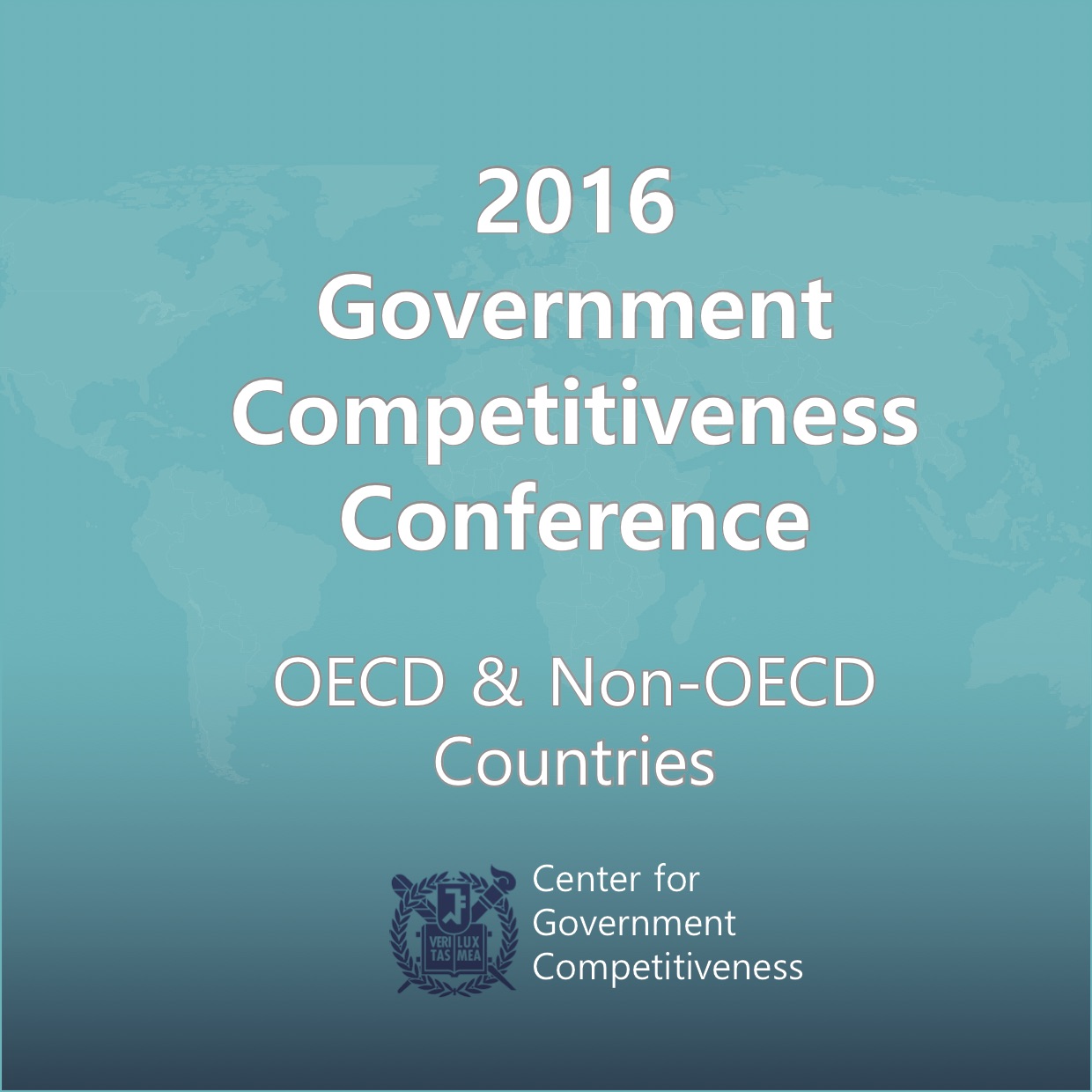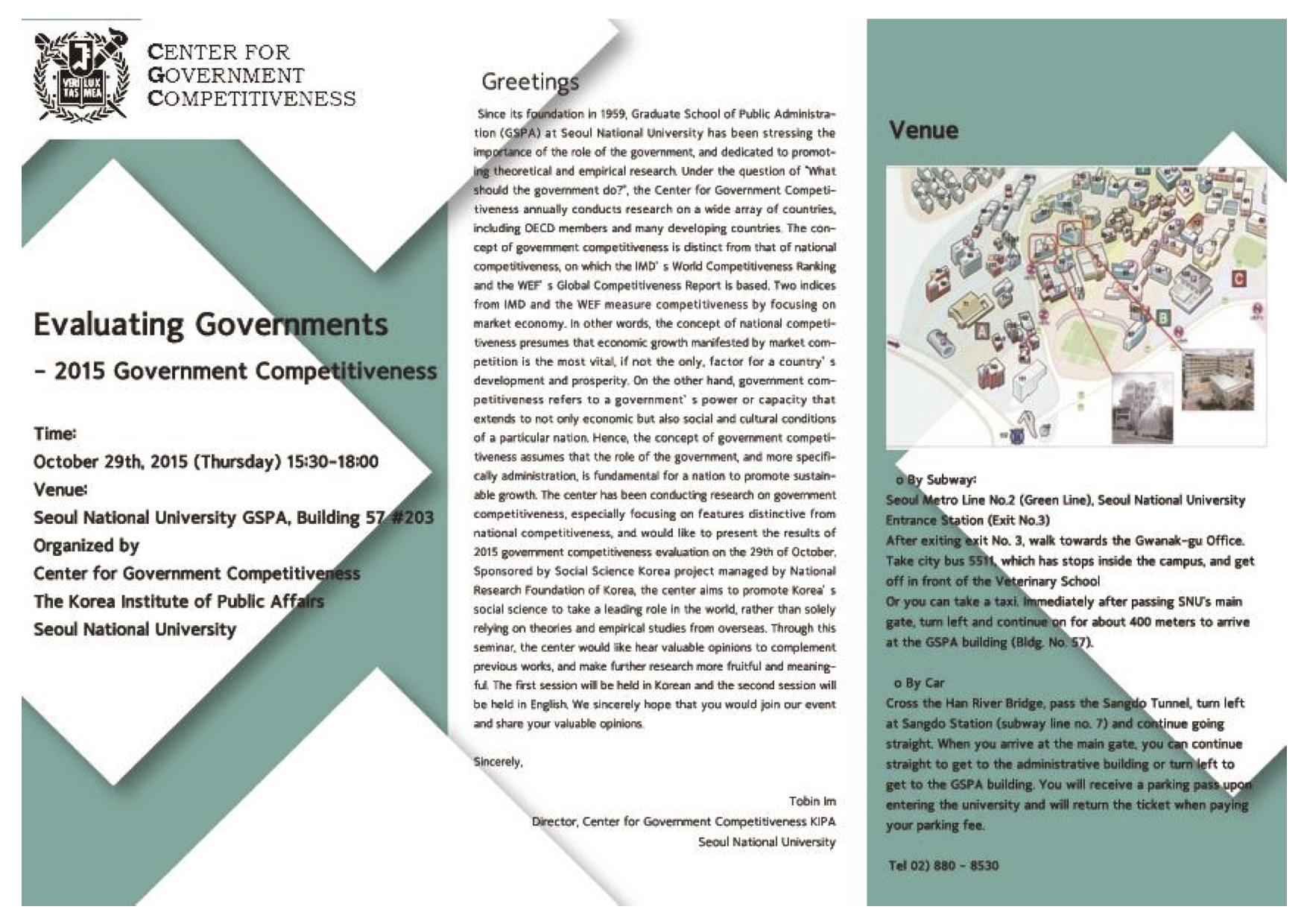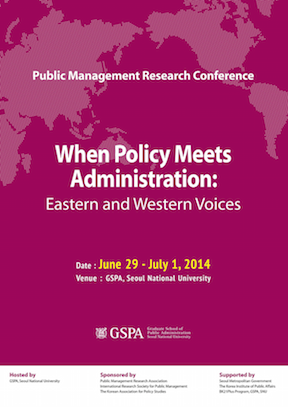- Events
- Press Release
- Our Research Team
- Funding Agencies and Partners
- Contacts
-
Weekly Semimar of Center for Government Competitiveness (210729)
-
-
In the middle of the COVID-19 pandemic, the Center for Government Competitiveness is now holding webinars every Thursday, at 19:00 in Room 203, Building #57 GSPA Seoul National University. Today, master's student Paul Kim presented on his experience in North Korea. Next, master's students Joongyul Kim and Jimin Song presented on the relationship between prostitution and AIDS policies.
-
(Youtube )
2020 Ministry of Education Academic Research Support Project Excellence Award Ceremony
-
-
Professor Tobin Lim, head of the Government Competitiveness Center, was awarded the 2020 Ministry of Education Academic Research Support Project Excellence Award.This year, out of the 21,505 academic and research support project outcomes in 2019, 156 candidate projects received through public offerings and recommendations were deliberated by an evaluation team composed of experts in each field of study.The Two Sides of Korean Administrative Culture: Competitiveness Or Collectivism?This book examines how the competitive spirit and collectivism inherent throughout Korean society have influenced the culture and behavior of administrative organizations. In particular, by analyzing various phenomena that can be seen in competition between organizations within the government, we explored the s..
-
The Korean Association for Public Administration (KAPA): Government Competitiveness Session II.
(zoom)
Comparative Government and Government Competitiveness Research Group Session II
-
-
In the annual winter conference of the Korean Association for Public Administration (KAPA) in 2020, Center for Government Competitiveness made its two sessions to discuss the past and the future of government competitiveness.Moderator: Hyun-seop Geum (Seoul National University)Presentation: Seong Si-kyung (Dankook University), Comparison of Public Enterprise Policy Governance: Focusing on France, Sweden, and KoreaDiscussion: Ki-Hoon Jung (KDI Graduate School of Policy)Presenter: Jesse W. Campbell (Incheon University), Marketization and the Public Service Ethic: Cross-Country Evidence of aDeleterious EffectDiscussion: Young-Hwan Lee (Wonkwang Health University)Presentation: Lee Hyun-guk (Daejeon University), measures to improve government competitiveness through joint production with gras..
-
The Korean Association for Public Administration (KAPA): Government Competitiveness Session.
(zoom )
Comparative Government and Government Competitiveness Research Group Session I
-
-
In the annual winter conference of the Korean Association for Public Administration (KAPA) in 2020, Center for Government Competitiveness made its two sessions to discuss the past and the future of government competitiveness.Session 1Moderator: Professor Ki Min (Jeju University)Presentation: Kim Kwon-sik (Small and Medium Business Research Institute), Comparison of Institutional Characteristics of Korean and Japanese Special Zones from the Perspective of the Spatio-temporal Dimension of Regulatory ReformDiscussion: Nakhyuk Choi (Gachon University)Presentation: Young-Hwan Lee (Wonkwang Health University)/Jin-Won Lee (Prime Minister's Office), Environmental stringency, outward FDI and export: Evidence from KoreaDiscussion: Kwang-Hoon Lee (Gangwon University)Presentation: Eunjin Hwang (Seou..
-
(Room 203, Building #57, Graduate School of Public Administration, Seoul National University)
Weekly Semimar of Center for Government Competitiveness (201029)
-
-
In the middle of the COVID-19 pandemic, the Center for Government Competitiveness is now holding webinars every Thursday, at 18:30 in Room 203, Building #57 GSPA Seoul National University. Today, Doctor Seok-dong Kim discussed why Costa Rica is exceeding South Korea in this year's GCI. According to his argument, Costa Rica's universal welfare system, a high proportion of renewable energy in energy consumption structure, and agriculture competitiveness were the major factors contributed to Costa Rica's high ranking score.
-
( Room 101, Building #57, Graduate School of Public Administration, Seoul National University)
Weekly Semimar of Center for Government Competitiveness (200917)
-
-
In the middle of the COVID-19 pandemic, the Center for Government Competitiveness is now holding webinars every Thursday, at 18:30 in Room 101, Building #57 GSPA Seoul National University. Today, Masters Student Jae-hyung Lee from the Department of Public Enterprise Policy presented on his dissertation topic, which is about the impact of transferring public institutions to "Innovation Cities." Next, Masters student Ji-Yeon Kim showed her progression from the last presentation, with a detailed version of result tables.
-
(Room 321, Building #57, Graduate School of Public Administration, Seoul National University)
GC FORUM: Public Sector also Suffers from COVID-19
-
-
To investigate government competitiveness determinants, CGC has been conducting surveys on South Korea's central government public employees for three years. Today, the chief of center, Professor Tobin Im presented on the results of the survey. Interestingly, the increased workload and work-intensity of public employees are 13% and 15%, each on average. However, major job-related outcome variables such as turnover intention, job satisfaction, and public service motivation turned out to be in a better status compared to last year.
-
(Room 321, Building #57, Graduate School of Public Administration, Seoul National University)
Weekly Semimar of Center for Government Competitiveness (200827)
-
-
In the middle of the COVID-19 pandemic, the Center for Government Competitiveness is now holding webinars every Thursday, at 18:30 in Room 321, Building #57 GSPA Seoul National University. Today, Ph-D student Danee Kim presented the potential ratings of GC index with the Python program. Next, Masters student Ji-Yeon Kim gave her dissertation topic, which is about the relationship between teacher's self-efficacy and autonomy in various aspects of management. Lastly, Post-doctor Hemin Choi discussed expanding bureaucracy in terms of the shadow government.
-
(204, Building #57, Graduate School of Public Administration, Seoul National University)
KEIO-SNU Joint International Conference
-
-
Keio University and GSPA had joint international conference on 21st February. In session 1, issues in Korean central government operation were discussed by Dong Wook Kim, professor of SNU, who pointed out “The Blue House Government” problem. This means the Blue House holds all the power and unwilling to allocate decision-making and personnel authority to central government agencies represented by ministers. Next, Masataka Harada from Fukuoka University introduced relationship between war and suicide rates with evidence from the stragegic bombing to Japan during WWII. Then Jungho Park from Keimyung University discussed citizen’s policy acceptance for new renewable energy and technology. Moderator Soon Eun Kim from Seoul National University and discussant Wonhyuk Cho from Victoria Unive..
-
(204, Building #57, Graduate School of Public Administration, Seoul National University)
Experimental Methods in Public Administration Research
-
-
Professor Gregg G. Van Ryzin from Rutgers University -Newark gave an inspiring presentation on "The Perceived Fairness of Active Representation: Evidence from a Survey Experiment". He made an overview on experimental methods in Public Administration Field, introducing he and his colleagues' four studies that are published in PA top journals. According to his speech, the reasons why survey experiments are booming are three: limitations of observational studies, dissatisfaction with not having solid causal evidence, and yet causal evidence is essential for public management. Then, based on this research method, Professor Van Ryzin discussed that citizens' judgement on policies can depend on certain ratio of minority public employees, which proves one of major assumptions in representative ..

-
Toward a Good Government in the New Developmental Era.
(Graduate School of Public Administration, Seoul National University, 1 Gwanak-ro, Gwanak-gu, Seoul, Korea )
2019 SNU-Asia BK21 Conference: Call for Paper (Submission of Abstracts Deadline: May 15, 2019)
http://gspa.snu.ac.kr/en .
Hongrae, Lim, Graduate School of Public Administration at Seoul National University, Seoul. (Email: keynes@snu.ac.kr)
-
-
Call for PaperTo implement the new sustainable development goals (SDG),various efforts must be coordinated through new public governance. However, there exists considerable controversy about governance priorities and the types of governance capabilities that are critical.Graduate School of Public Administration, Seoul National University would like to host theto provide an academic platform for researchers, practitioners, and policy makers in Asia and other parts of the globe as well to discuss the latest research ideas on what is a good government and how to develop a country’s economy in the sustainable way. We would like to draw upon diverse perspectives from various disciplines including public administration, public policy, political science, economics, and etc. We also encourage y..
-
(203, Building #57, Graduate School of Public Administration, Seoul National University)
2018 Government Competitive Conference: Improving Government Competitiveness in an age of turbulence
-
-
[Panels]Im, Tobin / Professor of SNU, Center for Government CompetitivenessKum, HyunSub / Professor of SNU, Center for Government CompetitivenessChoi, Taehyun / Associate Professor of SNU, Center for Government CompetitivenessPark, JeongHun / Professor of SNUCampbell, Jesse / Professor of Incheon National UniversitySophal, Yem / Commercial counselor, Embassy of CambodiaOstos-Alfonso, Edwin / Minister Plenipotentiary, Embassy of ColombiaQuiros, Rodolfo Slano / Ambassador of Costa RicaMustefa, Nuredin / Minister Counselor, Embassy of EthiopiaUwizeye, Michael / First Secretary, Embassy of RwandaPelawaththage, Nilathi K. / Second Secretary, Embassy of Sri Lanka
-
(203, Building #57, Graduate School of Public Administration, Seoul National University)
'Policy & Knowledge' Forum #929 '2018 Government Competitive Rankings'
-
-
[Participants]Chair person : Taebeom, Yoon(Director in Korea Research Institute for Local Administration)Presenter : Tobin, Im(Professor, Seoul National University)Discussant : Seongsoo, Oh(Professor, Hanyang University), Sooki, Lee(Journalist,Joongang Ilbo)[Contents]- Discussion about '2018 Government Competitive Result : Korea, Rep.'
-
(Myasnitskaya, 20, Room 102.)
Open Lecture in Russia
-
-
Government competitiveness for the 21st century: Theories and some implications for RussiaSpeaker: Im Tobin (Professor, SNU / Director of Center for Government Competitiveness)Venue:Higher School of Economics
-
(Room 108, Building #57-1, GSPA )
Weekly Seminar
centerforgc@gmail.com
-
-
SSCI paper review: The conceptualization of country attractiveness: a review of research (International Review of Administrative Sciences, forthcoming)Despite the growth of literature on country attractiveness covering a wide range of research areas, minimal effort has been expended on its conceptualization in public administration. This article seeks to add to previous scholarly works by clarifying the concept and operationalizing its multi-dimensions to explain the effects of the attractiveness of nations based on theoretical grounding. More specifically, by examining prior studies in international business, tourism and migration research, the article attempts to reorganize the constituent elements of the concept into a multi-dimensional framework from a sustainable development perspec..
-
(Room 203, Building #57, GSPA)
Evaluating Governments - 2015 Government Competitiveness
centerforgc@gmail.com
-
-
◆ Session 1 OECD (15:30 - 16:40) Welcome Tobin Im, Professor, Graduate School of Public Administration, Seoul National University Chair Keun Namkoong, President, Seoul National University of Science Technology Presentation Tobin Im, Professor, Graduate School of Public Administration, Seoul National University Title: Analysis of OECD Countries’ Government Competitiveness and Implication Panel Debate •Song-Ho Lee, Professor, Department of Public Administration, Korean National Police University •Sung-Ju Kang, Director, Internet Convergence Policy Bureau, Ministry of Science, ICT and Future Planning •Chun-Oh Park, Professor, Department of Public Administration, Myongji University. •Young-Bok Suh, Chairman, Council on Policy, Citizen's Coalition for Better Government. ◆ Session 2 Dev..
-
(Room 108, Building #57-1, GSPA)
Weekly Seminar
centerforgc@gmail.com
-
-
Second review session: A review of Government Competitiveness indicators. Policy areas, input-throughput-output-outcome indicators, their correlations, causal relationships between indicators, and raw data for each category have been reviewed. Furthermore, various new indicators have been suggested, and these are to be reviewed until next session. Third paper review: Competitiveness: A Dangerous Obsession by Paul Krugman (1994). In this paper, Krugman argues that the concept of competitiveness in National Competitiveness has been misused and misunderstood. In fact, he argues that National Competitiveness is completely different from Business Competitiveness.
-
(Room 108, Building #57-1, GSPA)
Weekly Seminar
centerforgc@gmail.com
-
-
A review of overall Government Competitiveness indicators starts from this week. Policy areas, input-throughput-output-outcome indicators, their correlations, causal relationships between indicators, and raw data for each have been reviewed. Second paper review: International Competitiveness and the Role of Government in the Globalized World Economy This paper addresses Estonian economic development, illuminating the importance of government roles in developing countries. The presentation reviews the main points and identifies areas of complementarity with the concept of Government Competitiveness.
-
(Room 108, Building #57-1, GSPA)
Weekly Seminar
centerforgc@gmail.com
-
-
Policy Change in Korea’s Retirement Pension System: Focusing on Small Business Cases From the perspective of the Sabatier’s Advocacy Coalition Framework, policy changes in Korea’s retirement pension system has been preceded by confrontations among two powerful coalitions: labor and business. However, while the first change (1997-2005) fits the model, the second change (2005-2012) does not. How can this be explained? Review of papers about government competitiveness (and related concepts) starts from this week. First paper: “What is Governance?” (Francis Fukuyama, 2013) This paper focuses mainly on the quality of government through four perspectives: 1) procedural 2) capacity=input 3) output 4) autonomy The output perspective is examined due to its relevance to the concept of Governm..
-
(Room 108, Building #57-1, GSPA)
Weekly Seminar
centerforgc@gmail.com
-
-
Agenda Setting Process of Immigration Policy using Cobb Elder’s Agenda-setting theory: Focusing on Foreign Social Integration Education Among various foreign social integration policies, education policy is among the most important. This includes the overall education system of providing information about language, law, history and culture to foreigners living in Korea for their adaptation. Research questions: 1. Why and how was this education policy introduced? 2. Why has this education system failed? 3. How has this education system succeeded? These issues are reviewed from the perspective of the policy streams model. A Fixed Effects Analysis of Vietnam Economic Development Using data about Vietnam’s economic development, the relationship between two measures of governance innovation..
-
(Room 108, Building #57-1, GSPA)
Weekly Seminar
centerforgc@gmail.com
-
-
The Effects of Perceived Gender Inequality on Public Service Motivation: A Comparative Approach to Public and Private Organization The role of the expectations for women from society and organizations is examined. When gender is the independent variable, variables such as organizational commitment and transformation of leadership are low. Would perceived gender inequality affect levels of individual public service motivation? There has been a forum that criticized the findings of the 2014 Government Competitiveness report. Those comments are reviewed.
-
(Room 108, Building #57-1, GSPA)
Weekly Seminar
centerforgc@gmail.com
-
-
The Impact of Official Development Assistance on Government Effectiveness and Quality of Life: From the Perspective of Government Competitiveness The relationship between ODA and the quality of life, and ODA and government efficiency, are increasingly popular topics. However, further discussion about instrument variables is required. Another question arises: Would the division of countries according to their GDP affect ODA’s effects? Analysis on Variable Factors of Foreign Social Integration Policy: in the Perspective of Advocacy Coalition Framework. As the population of Korea decreases, the domestic foreign-born population has increased dramatically, from one million in 2008 to over two million in 2015. This is notable given that the foreign-born population increased by only one millio..
-
(Room 108, Building #57-1, GSPA)
Weekly Seminar
centerforgc@gmail.com
-
-
Low-income Housing Policies from the Government Competitiveness Perspective Low-income housing policies can be considered one of the elements of Government Competitiveness. While net income increases, the proportion of residents in rental housing has also increased. What causes this phenomenon? Low-income housing policies of multiple countries are reviewed from 1950’s to 2010’s. This paper also asks whether human capital and leadership affect government capacity. Hypothesis: 1. The relationship between human capital and government capacity is positive. 2. The relationship between leadership and government capacity is positive. Findings: human capital is not statistically significant, while leadership is significant. Political stability is also statistically significant. Civic Enterpris..
-
“Building a Stronger and More Equitable Society: The Role of Public Administration”.
(Hyatt Regency Hotel, Chicago, IL, USA)
2015 ASPA Conference
-
-
The American Society for Public Administration (ASPA)’s 76th Annual Conference expanded plenary sessions and featured prominent leaders, exploring the theme from both U.S. and international perspectives. The conference honored excellence in public service through the National Public Service Awards. A series of critical issue roundtable dialogues tackled some of field’s most important challenges, from the key issues that state and local governments will face over the next decade to the nexus of public management, the public sector, and the 2016 election. Professor Tobin Im was both a moderator and presenter in the “Founders’ Forum – From Theory to Practice” session, with a presentation entitled “Government Effectiveness and Competence: International Perspectives.” He presented a p..
-
(Room 203, Building #57, GSPA)
Weekly Seminar
centerforgc@gmail.com
-
-
The relationship between time and competitiveness is an important one to study. If the quality of government officials is high, then the service time would be reduced. This reduced time is connected to the concept of competitiveness. This thesis is reviewed and discussed. With the increase in overall globalization, the globalization of local government is also increased. How much and in what way does the globalization of local government and the international interactions of local government affect the competitiveness of local government? Is this pattern helpful to the advancement of administrative techniques? Is this a positive trend for local development? Has the understanding of citizens about these processes developed?
-
(Room 108, Building #57-1, GSPA)
Weekly Seminar
centerforgc@gmail.com
-
-
The GCC team conducted a research visit to Mongolia. The findings of previous studies about Mongol have been confirmed, and the 2014 Government Competitiveness ranking (including individual fields) have been reviewed according to Mongol’s circumstances. What is the key difference between the economic development of Mongol and Korea? This question aims to identify particular characteristics of Mongol’s development.
-
(Room 108, Building #57-1, GSPA)
Weekly Seminar
centerforgc@gmail.com
-
-
The Impact of Aid Dependence on Government Competitiveness and Economic Growth There are two opposing arguments regarding aid for development. One is “aid-dependency theory” and the other is “the cure for poverty.” The following process based on Easton’s “systems theory” is reviewed: Net ODA % of Government Expenditure [Input] - Government Competitiveness Index [Throughput] + Corruption Economic Growth [Output] Allocation [Feedback] From this process, corruption is identified as the principal challenge. Competitiveness of Korea Centers for Disease Control and Prevention How much PR done by KCDC contributed to OPR (organization-public relationship) outcomes for citizens? - Independent variable: PR variable and administrative variable - Mediating variable: social media engagement - ..
-
(Room 108, Building #57-1, GSPA)
Weekly Seminar
centerforgc@gmail.com
-
-
Towards a Novel Approach to Government Competitiveness: A Critical Assessment of Competitiveness Indices To compare for other indices and Government Competitiveness, an assessment table is formed for discussion. Among 12 indices of GCI, which index is appropriate to compare with Government Competitiveness?
-
(Ritsumeikan University Umeda Campus, Osaka Japan)
Major Issues of Public Administration in the Smart Governance Era
-
-
The Graduate School of Public Administration, Seoul National University, is hosting this year’s PMRC conference, attracting a diverse pool of public management researchers and generating meaningful discussions and debates about recent public management issues. There are the major topics: - Media and Society - Governments and Competitiveness - Performance and Organization - Time, Public Policies, and Public Organizations Professor Tobin Im and Dongwook Seoh from the Center for Government Competitiveness presented a paper entitled “Government Competitiveness Analysis in Developing Countries from the Perspective of the Government Capacity.”
-
(Room 108, Building #57-1, GSPA)
Weekly Seminar
centerforgc@gmail.com
-
-
Measurement of government efficiency in developing countries using data envelopment analysis (DEA): from the perspective Government Competitiveness This paper measures Government Competitiveness in developing countries. DEA is used to measure “efficiency” in particular. The paper also examines the relationship between efficiency and Government Competitiveness. “The Politics of National Development” (Taketsugu Tsurutani, 1973) is reviewed on the following dimensions: 1. The relationship between government capability and political leadership - Government capability: regulation, extracting, distributing - Necessities of political leadership: commitment, intelligence and technique, dominance 2. The strategy of compensatory mobilization - Curative policies - Palliative policies 3. Compens..
-
(Room 108, Building #57-1, GSPA)
Weekly Seminar
centerforgc@gmail.com
-
-
The GCC research team gathers to discuss factors behind the ranking changes between 2013 and 2014 Government Competitiveness (OECD countries). These include overall rankings as well as each field’s ranking. The focus countries are the Netherlands, Finland, Switzerland, New Zealand, Australia, Luxemburg, France, Austria, and Italy.
-
(Room 108, Building #57-1, GSPA)
Weekly Seminar
centerforgc@gmail.com
-
-
What affects the satisfaction of civil administration service? The results of the survey are as follows: 1. Accessibility, convenience, speed, accuracy are the key factors. This is supported by preceding research. 2. Among the attachment to local society factors, identity apparently affects satisfaction in civil administration service. This implies the importance not only of the exchange process between public officers and citizens, but also emotions about the status (local society) of citizens. The Second-stage of Government Competitiveness research After analyzing data of the education budget of primary local governments (Seoul), the contents have been reviewed according to incremental model. Various independent, dependent, and control variables have been discussed. Three research ques..
-
(Room 108, Building #57-1, GSPA)
Weekly Seminar
centerforgc@gmail.com
-
-
The policy making process of the retirement pension system is reviewed according to two models. The first is the “garbage can” model, and the second is the Kingdon’s “multiple streams” model. After receiving the final results of the 2014 Government Competitiveness study, the GCC research team discusses which countries should be selected for a case study and country report. Considering both the feasible results of index and priority partner countries of Korea (ODA), the following are selected: Mongolia, Indonesia, Rwanda, Uganda, Columbia, Russia, and China.
-
(Room 108, Building #57-1, GSPA)
Weekly Seminar
centerforgc@gmail.com
-
-
Based on new institutionalism and behaviorism, the effects of the maternal protection system are reviewed. The hypotheses are: 1. Maternal protection systems affect the behavior of members of the organization. 2. The introduction of maternal protection systems affects the cognition of female employees. 3. The use of maternal protection systems affects the cognition of women employees. Nuclear plants are a major issue in Korea. Due to accidents in Japan and Korea, the morale of nuclear plants’ employees has been dramatically diminished. Since there has been no study regarding nuclear plant employees, the idea is to understand the job characteristics affecting employee performance, especially focusing on workers with shift work schedules. Korea’s retirement pension system started in the ..
-
(Room 108, Building #57-1, GSPA)
Weekly Seminar
centerforgc@gmail.com
-
-
After gathering data regarding multiple approaches to analyzing local government competitiveness, there has been a discussion to determine final candidates for a case study. Peongtaek-si, Paju-si, and Seosan-si are nominated, and Seosan-si is the official selection. It is evident that there is a tendency to avoid hiring female employees in the private sector. Although government emphasizes recruiting female employees, this discrimination is no different for public company. Pursuant to this claim, the effects of a maternal protection system are analyzed (using K-water and its employees).
-
(Room 108, Building #57-1, GSPA)
Weekly Seminar
centerforgc@gmail.com
-
-
Welfare is no longer government’s issue alone. Welfare is also becoming the private sector’s business. Retirement pension systems are an example. However, the Korea Worker’s Compensation and Welfare Service has entered the market of retirement pensions, and this is a regressive development. What has caused this and what is the competitiveness and role of KWCW? To research the relationship between citizen participation and the formation of governmental trust, the internet public sphere has been analyzed. After analyzing 500,000 data uploads during the 18th presidential election period, a new theoretical proposition has been confirmed and multiple factors affecting governmental distrust have been identified. The discussion focuses on criticizing the problems of this research, such as th..
-
(Room 108, Building #57-1, GSPA)
Weekly Seminar
centerforgc@gmail.com
-
-
Uganda is one of the poorest countries in the world. However, its economy is currently developing. Oil deposits recently discovered in the country have ignited political and administrative problems. Because there is no official document about Uganda in the Korean language, this report aims to give details on policy coordination systems of Uganda with explaining Uganda’s Government Competitiveness. The political and administrative systems of Uganda are briefly covered. ODA systems in Uganda are also mentioned during the discussion. Indicators for the 2014 Government Competitiveness index have been discussed based on 2013 indicators. The updated index includes 60 countries, enlarged from the list of OECD countries in 2013. Because the new index covers developing countries, new fields and ..
-
(Room 108, Building #57-1, GSPA)
Weekly Seminar
centerforgc@gmail.com
-
-
Following previous seminar, this seminar includes further discussion about the education budget of primary local governments. The structure and the process concerning the arrangement of education budgets are surveyed, and influential factors are identified. It is noted that the political nature and central policy of the head of primary local governments should not be under-estimated. There has been a discussion to specify eight characteristics of competitive governments based on local governments in Korea. The conditions of competitiveness are the focus of this discussion, and local areas for possible case studies are identified. It is also determined that various statistical data should be collected. A presentation about time-lag theory is delivered.
-
(Room 108, Building #57-1, GSPA)
Weekly Seminar
centerforgc@gmail.com
-
-
What affects the education budget of primary local government? To analyze the influencing factors, the idea to analyze Seoul’s education budget for multiple years is suggested. However, Seoul’s education budget is too small a unit of analysis to produce any meaningful results. Further, the relationship between the office of education and primary local government complicates the education budget process and attempts to analyze it. Due to these problems, a proper approach for this research is discussed.










































